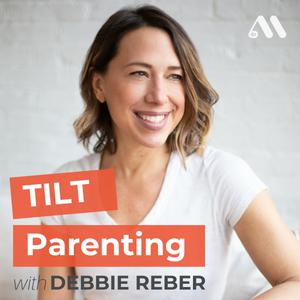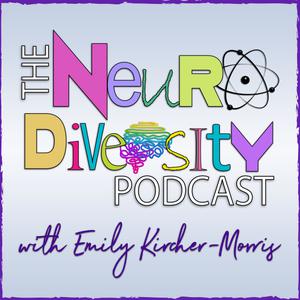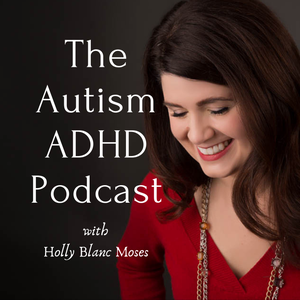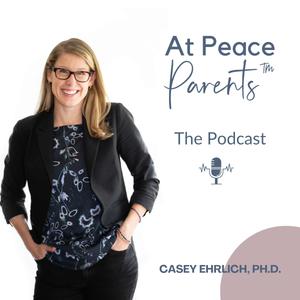
TILT Parenting: Raising Differently Wired Kids
Debbie Reber
- 53 minutes 9 secondsTPP 424: Creating Neurodiversity-Affirming Schools, with Amanda Morin & Emily Kircher-Morris
Today we’re diving into a topic that’s not just timely but that can transform education for all students: creating neurodiversity-affirming schools. Joining me to share their vision for what’s possible in education are two extraordinary advocates and experts, Amanda Morin and Emily Kircher-Morris who have collaborated on a wonderful new book on the topic, just out today in fact, Neurodiversity Affirming Schools: Transforming Practices So All Students Feel Accepted & Supported.
In today’s episode, we explored why embracing neurodiversity in schools benefits every student, not just those with IEPs. Amanda and Emily unpacked the barriers to change in education, including stigma and fear, and introduce how strategies like Universal Design for Learning (UDL) can be used to create inclusive classrooms. We also discussed the Neurodiversity Affirming Teacher's Compact, a framework for educators to embrace diverse learning needs, and finally, the importance of fostering self-advocacy skills in neurodivergent students.
About Amanda Morin
Amanda Morin is a neurodivergent neurodiversity activist, an award-winning author of six books, early childhood specialist, and nationally known speaker, deeply committed to fostering accessible and inclusive environments for neurodivergent individuals. She leverages her expertise in learning and child development, Universal Design for Learning (UDL), special education, advocacy, and mental health to distill complex data into easily digestible information for parents, educators, and employers who want to advance the mission of creating inclusive content, programs, and strategies to make the world accessible to all. Amanda proudly serves as a subject matter expert for the DUCC (Developing & Using Critical Comprehension) project for the Polarization & Extremism Research & Innovation Lab (PERIL) at American University, sits on the advisory board of Digital Promise’s Learner Variability Project, the professional advisory board of Matan, and the Technical Expert Panel of the American Academy of Pediatrics Center of Excellence on Social Media & Youth Mental Health.
About Emily Kircher-Morris
Emily Kircher-Morris, LPC, is a mental health professional and advocate for neurodiversity, with a deep commitment to creating inclusive and supportive environments for all students. As a Licensed Professional Counselor, she has spent over a decade working with neurodivergent individuals, specializing in providing therapy and resources that empower her clients to thrive. Her passion for this field is deeply personal, as she herself navigated the educational system as a twice-exceptional (2e) student, experiencing firsthand the challenges and misunderstandings that often accompany neurodivergent experiences. This early insight fueled her dedication to transforming educational practices to be more affirming and supportive. In addition to her clinical work, Emily is the host of the popular Neurodiversity Podcast, where she explores a wide range of topics related to neurodivergence, often interviewing leading experts, educators, and individuals with lived experience.
Things you'll learn
- Why neurodiversity-affirming practices in schools benefit all students, not just those with IEPs
- Why recognizing and supporting diverse learning styles is essential for effective teaching and how it’s possible to do so in traditional classrooms
- Why fear of stigma and change remains a major barrier in education, and what we can do about it
- What schools and educators can do to create inclusive, neurodiversity-affirming classrooms
- What Universal Design for Learning (UDL) is and why it’s a critical framework neurodivergent learners
Resources mentioned
- Neurodiversity-Affirming Schools: Transforming Practices So All Students Feel Accepted & Supported by Emily Kircher-Morris and Amanda Morin
- The Neurodiversity-Affirming Teachers’ Compact of Shared Beliefs (PDF)
- Neurodiversity University Education Hub
Learn more about your ad choices. Visit megaphone.fm/adchoices
21 January 2025, 10:00 am - 42 minutes 40 secondsTPP 176a: Dr. Jill Emanuele on Handling Sibling Challenges
Dr. Jill Emanuele, senior director of the Mood Disorders Center at the Child Mind Institute, talks about how parents can best support their children who are struggling in the dynamic with their sibling.
Learn more about your ad choices. Visit megaphone.fm/adchoices
17 January 2025, 4:48 pm - 45 minutes 12 secondsTPP 423: Cathy Adams on Navigating the Complexities of Raising Daughters
Today, we’re diving into a complex and nuanced topic—raising daughters in today’s world. Joining me for this conversation is Cathy Adams, a longtime friend of the pod, powerhouse in the parenting space, and champion of mindful, connected parenting.
Her latest book, which takes center stage in today’s discussion, is Restoring Our Girls: How Real Conversations Shape Our Daughters' Lives, Help Them with Teen Challenges, and Remind Them That They Matter. With her background as a clinical social worker, certified parent coach, and former child and family therapist—as well as her experience as a mom of three daughters and university professor—Cathy brings a rich, multifaceted perspective to this important topic.
In this episode, Cathy and I explore the unique challenges girls face today, from societal pressures and cultural conditioning to navigating a fast-paced, often judgmental world. We discuss the importance of parents addressing their own emotional baggage, being mindful of their reactions, and recognizing how fear can hold us back from having the messy but meaningful conversations our daughters need. Cathy also shares strategies for creating judgment-free spaces where girls feel heard, validated, and supported in becoming their authentic selves.
About Cathy Adams
Cathy Cassani Adams, LCSW, co-hosts the long-running Zen Parenting Radio podcast and founded the Zen Parenting Conference in Chicago. She is the author of Zen Parenting and Living What You Want Your Kids to Learn (both Nautilus Award and International Book Award winners) and her upcoming 2025 release, Restoring Our Girls. Cathy is a clinical social worker, certified parent coach, former elementary school educator, and yoga teacher. She was a blogger for The Huffington Post and a former columnist for Chicago Parent Magazine. She previously worked as a Child and Family Therapist and Clinical Educator at Lurie Children’s Hospital of Chicago and now teaches in the Sociology and Criminology Department at Dominican University. She lives outside Chicago with her husband, Todd, and their three daughters.
Things you'll learn
- How cultural conditioning and societal expectations on girls can impact them (and what we need to know about it)
- Why parents must address their own emotional baggage to avoid projecting it onto their children
- How being mindful of our own reactions in the moment will help us communicate more effectively with our children
- The role fear plays in preventing meaningful conversations which leads to missed connection opportunities
- The benefits of engaging in messy and imperfect conversations for promoting authenticity
- How to create a judgment-free space where girls feel heard and validated to support their emotional growth
Resources
- Zen Parenting website and resources
- Restoring Our Girls: How Real Conversations Shape Our Daughters' Lives, Help Them with Teen Challenges, and Remind Them That They Matter by Cathy Adams
- Zen Parenting: Caring for Ourselves and Our Children in an Unpredictable World by Cathy Adams
- Zen Parenting 2025 Summit
- Zen Parenting on Instagram
- Cathy Adams on Zen Parenting & Caring for Ourselves and Our Children in an Unpredictable World (Tilt Parenting podcast)
- Zen Parenting on Facebook
- Zen Parenting Radio podcast
- Getting Aligned Through Parenting and Marriage Challenges, with Zen Parenting’s Cathy and Todd Adams (Tilt Parenting podcast)
- Pop Culturing Podcast
- Rescuing Our Sons: 8 Solutions to Our Crisis of Disaffected Teen Boys by Dr. John Duffy
Learn more about your ad choices. Visit megaphone.fm/adchoices
14 January 2025, 10:00 am - 48 minutes 13 secondsTPP 175a: Kathryn Haydon Talks About Creatively Parenting
Creativity coach, speaker, and author Kathryn Haydon talks about the benefits of bringing more creativity into our parenting lives raising differently wired kids.
Learn more about your ad choices. Visit megaphone.fm/adchoices
10 January 2025, 1:02 pm - 44 minutes 21 secondsTPP 422: Dr. Amy Laurent on Shifting the Conversation Away from Emotional Regulation and to Energy Regulation
Happy New Year, and welcome to the podcast's winter season! I have some really special conversations to share with you this year, and I’m thrilled to kick things off with what I can only describe as an absolutely fascinating conversation with Dr. Amy Laurent about ENERGY—specifically, the power and freedom in shifting the focus from emotional regulation to energy regulation when supporting neurodivergent individuals, including ourselves.
You might remember Amy from her last appearance on the show with Dr. Jacquelyn Fede, where they shared about their autistic-allistic partnership Autism Level UP!—a collaboration dedicated to providing education, accessible resources, and practical strategies to increase active engagement for autistic individuals and their communities. If you haven’t heard that one yet, it’s a great listen! You can find it at tiltparenting.com/session328 or through the link in the show notes for this episode.
In this conversation, we dive into Amy and Jacquelyn’s latest resource, Energy: The Framework, Tools, Strategies & Logic to Support Regulation manual, a comprehensive guide to the Autism Level UP! tools and their innovative approach to energy regulation. Designed with autistic and neurodivergent people in mind—but perfectly suitable for all neurotypes—this manual introduces ways to understand and support energy levels for yourself or others through tools, worksheets, and practical strategies.
I LOVE this resource, so it was a real treat to explore its concepts with Amy. In our chat, Amy shares why energy regulation is often a more accessible and relatable framework than emotional regulation for many autistic people, how the “Energy Meter” helps individuals identify their energy states and foster self-awareness, and how parents can better co-regulate and connect without judgment by recognizing and reflecting on energy states. We talk a lot on the show about becoming fluent in your child, and what we’re covering today takes that concept to an entirely new level.
About Dr. Amy Laurent
Amy Laurent, PhD, OTR/L is the co-director of Autism Level UP! an autistic / allistic partnership dedicated to the provision of education, accessible resources, and practical strategies focused on increasing active engagement for autistic individuals and the members of their communities. She is a co-author of the SCERTS Model and frequently lectures internationally. She is passionate about neurodiversity and helping others to honor and understand the implications of “different ways of being” in relation to navigating the physical and social world. Dr. Laurent strives to practice what she preaches and uses her love of play and movement to meet her own regulatory needs.
Things you'll learn from this episode
- Why energy regulation is a more accessible and relatable framework than emotional regulation for many autistic people
- How the “Energy Meter” helps individuals in identifying their energy levels and needs fostering self-awareness and practical strategies for balance.
- How parents can better co-regulate, connect, and support (without judgment) through recognizing and reflecting on energy states
- Why it’s critical that we tailor tools to meet unique needs of our children (ie: there is no one size fits all)
Resources mentioned
- Energy: The Framework, Tools, Strategies & Logic to Support Regulation by Dr. Amy Laurent and Jac Fede
- Autism Level UP!
- Autism Level UP! on Facebook
- Autism Level UP! on Instagram
- Autism Level UP! Co-founders Amy Laurent & Jacquelyn Fede on Learning From Autistic Self-Advocates (Tilt Parenting Podcast)
Learn more about your ad choices. Visit megaphone.fm/adchoices
7 January 2025, 10:00 am - 1 hour 10 minutesTPP 421: A Bonus Conversation with Dr. Stuart Shanker about Self-Regulation and Helping Our Children Successfully Engage with Life
Dr. Stuart Shanker, author of Self-Reg, shares his expertise on self-regulation, offering practical strategies and compassionate insights to help neurodivergent kids and their families manage stress and build self-awareness.
Learn more about your ad choices. Visit megaphone.fm/adchoices
31 December 2024, 9:00 am - 1 hour 11 minutesTPP 420:A Bonus Conversation with Jonathan Mooney About "Normal Sucks," the Neurodiversity Movement, and More
Jonathan Mooney, author and advocate, explores the neurodiversity movement, scaling advocacy, Universal Design in education, and intergenerational trauma, offering thought-provoking insights and inspiring reflections.
Learn more about your ad choices. Visit megaphone.fm/adchoices
27 December 2024, 9:00 am - 1 hour 6 minutesTPP 419: A Bonus Conversation with Phyllis Fagell on Identity & Belonging
In this episode, Phyllis L. Fagell, LCPC, shares actionable insights on fostering identity development, belonging, and resilience in children, with a focus on navigating social challenges, promoting inclusivity, and supporting neurodivergent and marginalized kids.
Learn more about your ad choices. Visit megaphone.fm/adchoices
24 December 2024, 9:00 am - 37 minutes 30 secondsTPP 174a: Victoria Biggs Shares Her Story of Being Dyspraxic
Academic, teacher, and writer Victoria Biggs shares her experience growing up as an autistic, dyspraxic child and explains how parents can support their similarly wired children
Learn more about your ad choices. Visit megaphone.fm/adchoices
20 December 2024, 8:00 am - 50 minutes 6 secondsTPP 418: Redefining Success for Neurodivergent Children, with Dr. Emily King
We live in a society where success is often defined by external markers like prestigious jobs, academic achievements, or traditional milestones. But as parents of neurodivergent kids, we know our children’s paths and timelines often look different. And while their journeys may not align with conventional notions of success, that doesn’t mean they’re any less meaningful or valuable. So, how can we redefine what success means—for our kids and for our families? That’s one of the big questions I explore with today’s guest, child psychologist Dr. Emily King.
In our conversation, Dr. Emily and I dive into redefining success for neurodivergent students, emphasizing the importance of joy, self-discovery, and effectiveness in their learning journeys. We explore how cultural definitions of success can be limiting, what’s happening in American public schools regarding neurodivergence, and the actionable steps we can take to help shift the paradigm. Most importantly, we talk about how to reframe “success” in our families in ways that empower our children to build autonomous, self-actualized lives on their terms.
About Dr. Emily King
Dr. Emily King is a Child Psychologist and former School Psychologist who has worked with neurodivergent children and teens for over 20 years. She received a Ph.D. in School Psychology from the University of North Carolina at Chapel Hill where she worked at Frank Porter Graham Child Development Institute and the Carolina Institute for Developmental Disabilities. She spent five years as a School Psychologist in Houston, Texas specializing in providing school-based mental health services in K-12 public schools. Dr. Emily now works in private practice in North Carolina supporting the mental health needs of neurodivergent youth, their families, and their teachers.
Dr. Emily hosts the Learn with Dr. Emily Substack where you can find her blogs and monthly parent workshops. She is also the creator of The Neurodiverse Classroom, a professional development curriculum for elementary and middle school educators. Dr. Emily has been featured on MSNBC’s Morning Joe, quoted in The New York Times and The Washington Post, and has written for Parents.com. You can learn more with Dr. Emily by listening to her podcast or following her on Substack.
Things you'll learn from this episode
- Why the 2 key ingredients for success for neurodivergent students are joy coupled with effectiveness
- How cultural definitions of success can be limiting for neurodivergent kids, and what we can do about it
- What is the state of neurodivergence understanding in American public schools and what we can all do to shift the paradigm forward
- How we can redefine “success” in our families and for our children in ways that empower them to create autonomous, self-actualized adult lives
Resources mentioned
- Dr. Emily King’s website
- Learn with Dr. Emily (Emily’s Substack)
- Learn with Dr. Emily Podcast
- Dr. Mona Delahooke’s website
- Brain-Body Parenting: How to Stop Managing Behavior and Start Raising Joyful, Resilient Kids by Dr. Mona Delahooke
- Beyond Behaviors: Using Brain Science and Compassion to Understand and Solve Children’s Behavioral Challenges by Dr. Mona Delahooke
- Dr. Mona Delahooke on the Power of Brain-Body Parenting (Tilt Parenting podcast)
- Dr. Mona Delahooke on Looking Beyond Kids Challenging Behaviors (Tilt Parenting podcast)
- Dr. Dan Siegel & the Window of Tolerance
- Stephen Porgess & Polyvagal Theory
Learn more about your ad choices. Visit megaphone.fm/adchoices
17 December 2024, 10:00 am - 50 minutes 20 secondsTPP 173a: What is Pathological Demand Avoidance in Children? With Dr. Melissa Neff
This episode is a deep dive into pathological demand avoidance in children (also known as PDA), which is typically defined as a pervasive developmental disorder that falls under the autism spectrum. It’s a label that’s frequently used in the United Kingdom, and it’s often defined as a complicated and misunderstood condition wherein some people have a heightened anxiety response to demands being placed on them. PDA isn’t universally recognized as a diagnosis, and it’s also a label rooted in controversy.
To talk with us about all of this is friend of the podcast Dr. Melissa Neff, a licensed clinical psychologist who specializes in the assessment of ADHD, depression, anxiety, trauma, nonverbal learning disorder, and autism spectrum disorders, about the diagnostic process.
Melissa Neff, Ph.D. is a clinical psychologist in private practice in Missoula, MT. She conducts psychological evaluations for children and adults. She specializes in the assessment of giftedness, ADHD, depression, anxiety, trauma, nonverbal learning disorder, and typical and atypical presentations of autism.
Learn more about your ad choices. Visit megaphone.fm/adchoices
13 December 2024, 8:00 am - More Episodes? Get the App
Your feedback is valuable to us. Should you encounter any bugs, glitches, lack of functionality or other problems, please email us on [email protected] or join Moon.FM Telegram Group where you can talk directly to the dev team who are happy to answer any queries.
 Beautifully Complex
Beautifully Complex
 Neurodiversity Podcast
Neurodiversity Podcast
 THE AUTISM ADHD PODCAST
THE AUTISM ADHD PODCAST
 Uniquely Human: The Podcast
Uniquely Human: The Podcast
 At Peace Parents™ Podcast
At Peace Parents™ Podcast
 ADHD Experts Podcast
ADHD Experts Podcast